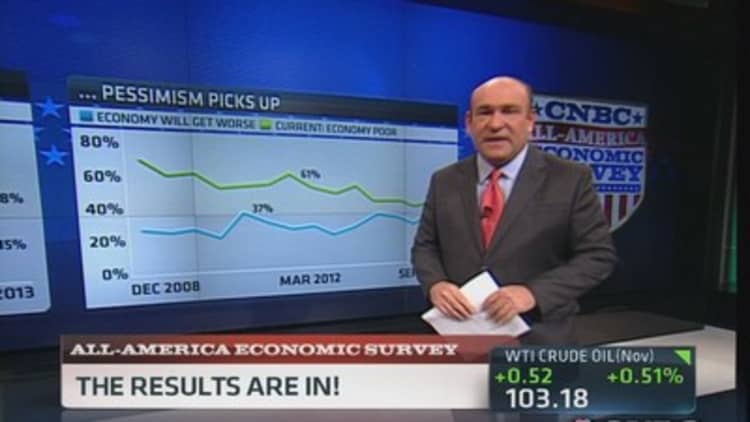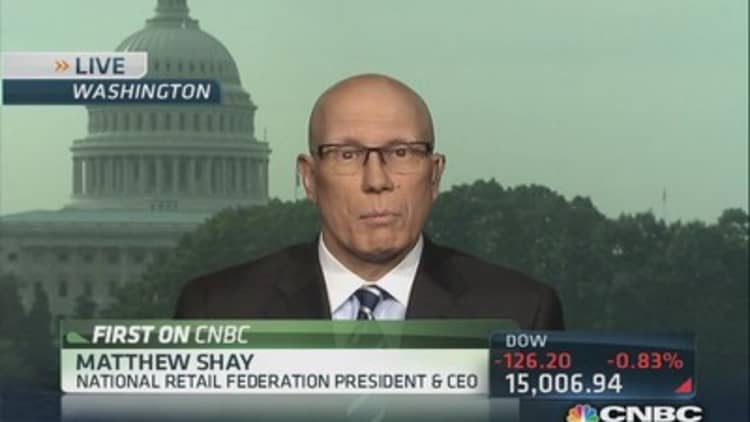As the government shutdown enters its tenth day, a widening circle of consumers are feeling its effects.
From serious issues such as suspended paychecks, auto recall delays and limited medical care to annoyances like rerouted marathons, canceled weddings and a dearth of king crab on restaurant menus, regular people are starting to see just how big a role government plays in their everyday lives. And experts say the litany of problems will only get longer as the shutdown continues.
"The announcement of the furloughing and the failure to not pay salaries takes several days to kick in," said Richard Ebeling, a professor of economics at Northwood University in Midland, Mich. "This will be rippling through the economy."
Affected consumers and the businesses they frequent will feel more of a pinch once the last pre-shutdown paychecks are sent out this week. Other shutdown effects are likely to be more pronounced as a backlog of permits, inspections and other regulatory requirements to open or operate a business pile up at the shuttered government agencies, Ebeling said.
(Read more: How 'preppers' are gearing up for a US default)
A dozen of the disparate effects regular consumers may be experiencing:
Lost income
About 800,000 federal workers were sent home without pay Oct. 1, although that number is now closer to 450,000 after the Pentagon ordered most of its furloughed employees back to work this week. (See a breakdown from The New York Times on who is working, and who isn't.) A bill to offer employees back pay is working its way through Congress, but many workers are expecting their last paycheck on Friday, Oct. 11—-and a partial paycheck at that.
To make ends meet, furloughed workers have been filing for unemployment benefits, and have even taken to selling items on eBay and Craigslist for cash.

It's not just government workers affected. Businesses near national parks and other attractions and monuments closed in the shutdown have cut workers' hours and, in some cases, temporarily as tourism falters. That has led to file for unemployment and seek help from food banks.
Limited medical care
The National Institutes of Health has estimated that for each week of the shutdown, its hospital will have to turn away an estimated 200 patients hoping to participate in . That number includes 30 children, 10 of whom are cancer patients. Patients must wait until the shutdown ends to be considered for the trials.
Frozen death benefits
Families of fallen soldiers typically receive a death benefit of $100,000 from the Pentagon within three days of a soldier's death. The Defense Department initially said in the shutdown, it had to the families of four U.S. soldiers killed in Afghanistan this weekend. That changed Wednesday, when Defense Secretary Chuck Hagel said the money would be paid out as a result of a deal reached with a private charity.
Shakier consumer safety
The National Highway Traffic Safety Administration has been forced to stop its field crash tests, investigations and vehicle recalls—including investigations into why a Tesla Model S battery caught fire earlier this month.
On the food front, the Food and Drug Administration has said it will not be conducting its routine inspections of food facilities. (The USDA has continued inspecting meat, poultry and egg products during the shutdown, however, and the FDA will continue to respond to outbreaks of food-borne illnesses.)
Shuttered day care
Twenty-three did not receive their government grants because of the shutdown, resulting in the closures of locations in six states. The New York Times reports that Houston billionaires have since stepped in with a $10 million donation to help keep the centers open.
Delayed disaster aid
After a in South Dakota, ranchers were left with little recourse to recoup their losses. During the shutdown, they cannot formally report losses to the USDA's Farm Service Agency or apply for disaster relief.

Thwarted vacation plans
Tourists planning to visit a national park, or popular attractions including the Statue of Liberty, Liberty Bell or Smithsonian museums, are out of luck. All are shuttered under the government shutdown. Travelers are forced to change their itinerary or eat the potential costs of cancelling.
Displaced weddings
Couples planning to get married in a national park or at a monument have found themselves scrambling to find new venues and, according to The Knot, officiants at Washington, D.C., superior courts have halted civil ceremonies.
Rerouted marathons
Races that use national parks, including the upcoming New York City Marathon, have been forced to reassess routes. Some organizers are changing race routes, while others are postponing or canceling races.
Halted tax seizures
And one bright spot, if you're a tax cheat: The IRS has stop initiating new levies and liens against citizens who have not paid their taxes.
Smaller crab harvest
If crab dishes at your local restaurant are pricier, or not on the menu at all this fall, it could be because of the shutdown. No permits are being granted during the shutdown, a move that effectively bars fishing vessels from setting traps during the four-week season, which starts Oct. 15.
Fewer craft beers
A casualty of the shutdown: The Alcohol and Tobacco Tax and Trade Bureau, which approves craft brewers' recipes and labels. It also issues permits for new breweries. The result, reports NBC, is that consumers may not see some new seasonal beers that would need government approval.
The saddest shutdown photo
Get out the tissues, folks.
One photo that has gone viral on the Internet Thursday really drives the shutdown's impact home. Dressed in an animal costume, a small child is seen standing outside the locked gates at the National Zoo. To make matters worse, the Zoo's official website says its live animal cameras are not being broadcast at this time. (The photo was shared on Twitter by Time.com Homepage Editor Alex Fitzpatrick after spotting it on Reddit.) — Eli Langer contributed to this report.
—By CNBC's Kelli B. Grant. Follow her on Twitter @kelligrant.


